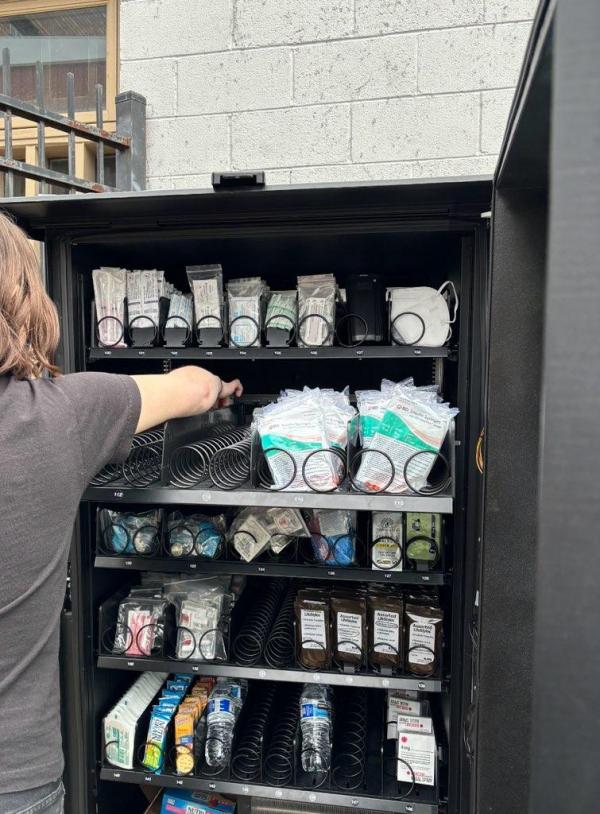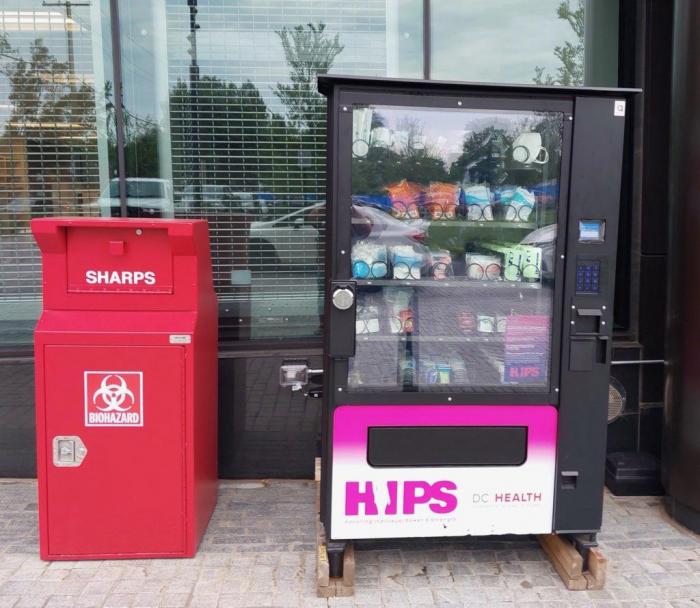UMD Researchers, D.C. Nonprofit Partner on Harm Reduction Vending Machine Study
Study Will Assess Machines’ Impact, Plus Community Perceptions
In cities and towns across the country, vending machines are increasingly finding a new purpose: Helping save lives with the naloxone, fentanyl test strips, sanitation supplies, and other harm reduction tools they’re stocked with. Maryland’s Anne Arundel County and the District of Columbia are just two of the latest locations to situate “harm reduction vending machines” like these in areas that have higher than average rates of overdose and/or unhoused individuals.
Two University of Maryland researchers are setting out to study the quantitative and qualitative impacts of three of D.C.’s harm reduction vending machines this spring, in partnership with the machines’ operator, a nonprofit organization called Honoring Individual Power and Strength, aka HIPS. HIPS’ mission is to promote the health, rights, and dignity of individuals and communities impacted by sexual exchange and/or drug use.
“We know in general, from public health evidence, that more naloxone is always a good thing in terms of reducing harm,” said Department of Anthropology Associate Professor Andrea López, who is leading the study. “We hope to both assess experiences and perceptions of the machines from the perspective of people who use them as well as community members in the area. A secondary goal is to continue to educate about the potential public health benefits of these interventions and the impact of harm reduction interventions and services more broadly.”
Harm reduction interventions have become more socially acceptable in recent years, as health departments and community-based organizations have sought to address community concerns by engaging the public in education campaigns. That’s why part of the new study will involve interviews with neighborhood business owners, residents, and other community stakeholders in addition to the individuals who use the machines.

There are no fees associated with using the D.C. vending machines. Rather, individuals are asked to initially get in contact with HIPS by calling 1-202-779-0486—also listed on the machines—to get a four-digit participant code that they will then punch into the machine. Later, a sample of those individuals will be offered the opportunity to participate in the UMD study, sometime between now and August 2024.
Because the machines were piloted in 2023, 150 individuals have already enrolled to use the vending machines.
“In the machine enrollment survey we ask about people’s preferred machine location, their demographic information—age, date of birth, gender identity, race/ethnicity, type of housing,—and substance use questions, including their current drug of choice, preferred way of taking that drug, etc.” explained López.
Greg Midgette, an assistant professor of criminology and criminal justice at UMD, will be responsible for analyzing these quantitative data points, as well as data related to what sorts of supplies are most used at each of the locations, and each location’s associated overdose and other drug-related harms.
“The evidence base to date on vending machines’ efficacy is promising, but small and mostly comes from outside the U.S. This work can inform many communities in search of interventions that lower the barriers to service utilization for people conventional programs in the U.S. often fail to reach,” he said.
The researchers hope to have preliminary results to share with HIPS and D.C.’s HIV/AIDS, Hepatitis, STD, and TB Administration, who provided HIPS with the funding needed to roll out and manage the vending machines, by the end of the year.
A bonus benefit of being responsible for the machines, HIPS staff says, is that it gives them a chance to interact with the communities they serve at times they normally wouldn’t get a chance to do so.
“The other day, I was at a vending machine and one guy walked up and was like, ‘Hey, it limits the number of fentanyl test strips and I need like 30 strips to distribute to my friends because we're getting cocaine that's laced with fentanyl.’ That’s an interaction we wouldn’t normally have been out to have,” said Starr O'Leary, HIPS’ Community Outreach Coordinator. “So we aren’t just interacting with our communities through the vending machines, the vending machines are allowing us to also interact with people that are just wandering by and wondering ‘Hey, how do we use these?’ Or ‘Hey, we can't get supplies of the volume that we need out of here. Can you help us?’ Staff can then discuss alternative options for getting higher volumes of supplies, such as interacting with their outreach van or coming to the center in the H Street NE corridor.”
The vending machines that are a part of the study are located at The Michelle Obama Southeast Center of Bread for the City (1640 Marion Barry Ave SE, Washington, D.C. 20020), the Whitman-Walker - Max Robinson Center (1201 Sycamore Dr SE, Washington, D.C. 20032), and Bread for the City in D.C.’s Shaw neighborhood (1525 7th St NW, Washington, D.C. 20001). HIPS may soon be adding additional vending machines to sites in D.C., something they already see as a step in the right direction.
“There's always going to be more of a need for harm reduction services and supplies than we're going to be able to provide in the current landscape of funding,” said Alexandra Bradley, HIPS Outreach and Community Engagement Manager. “These machines aren’t the be all and end all—if we had our real druthers, we would have 24-hour harm reduction centers and doing things that are going to have an even greater impact—but until and unless we can get those things, this is a very good and very important stopgap in terms of access to resources for folks.”
An event celebrating the official launch of the HIPS harm reduction vending machines is taking place at Whitman-Walker Health - Max Robinson Center at 1201 Sycamore Drive SE, Washington DC, 20032 on Friday, April 5 from 1-4 p.m. To learn more and register to attend, visit https://forms.gle/zobZ5TA2LWCJnenJ7.
Photos provided by Andrea López
Published on Thu, Apr 4, 2024 - 1:29PM




